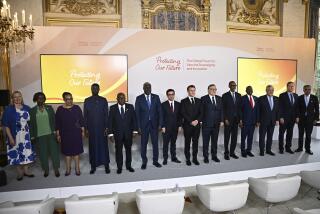Annan Wins AIDS Drug Price Cuts
UNITED NATIONS — In preparation for the United Nations’ biggest global campaign ever against a single disease, Secretary-General Kofi Annan persuaded six major drug companies Thursday to cut further and faster the prices of AIDS treatments they supply to developing countries.
The move followed Wednesday’s unveiling of a massive plan spearheaded by U.N. agencies to prevent and treat the epidemic.
Senior executives from Abbott Laboratories, Bristol-Myers Squibb, GlaxoSmithKline, Hoffmann-La Roche, Pfizer and Boehringer Ingelheim pledged to accelerate price reductions beyond cuts promised last May and to offer the less costly drugs to developing countries in Africa and elsewhere.
Drug firm Merck declined to attend the meeting, citing concerns about U.S. antitrust laws, but the company has offered a 90% price cut for two of its AIDS drugs in Africa.
The other six companies agreed to provide drugs at “the lowest possible price” and will negotiate the details for individual drugs later on a country-by-country basis, said Ben Plumley, a policy advisor at UNAIDS.
Annan said he was also aiming for “a dramatic leap forward” in prevention, education and care.
“The epidemic is the greatest public health challenge of our times, and we must harness the expertise of all sectors of society,” Annan said.
On Wednesday, a panel of Harvard University experts unveiled a detailed plan to combat AIDS in Africa, which has 70% of the world’s cases. The proposal will be presented in June at a global conference in New York as a blueprint for a joint effort by U.N. agencies, governments and private foundations.
The plan is the result of discussions involving top officials from the U.S., European and African governments as well as representatives of the World Bank, the World Health Organization, drug companies and private foundations.
“This is a plan to bring drug treatment to Africa and to finally break the back of the HIV pandemic,” said Harvard economist Jeffrey Sachs, who conceived the plan. “What is missing right now is international donor funding.”
The plan aims to raise about $6 billion a year from industrialized nations. About half the money would be used to accelerate HIV prevention programs; the other half would be used initially to get more AIDS medicine to the estimated 25.3 million Africans who are infected.
The U.S. share would be about $2 billion, increasing to about $3 billion by 2006, or about $10 a year for each American--”a movie and popcorn,” Sachs said.
Because of Africa’s poor infrastructure, there is concern over whether countries will be able to distribute the drugs and monitor their use. And if instructions for taking the pills are not followed carefully, doctors fear, a drug-resistant strain of the virus could develop.
But U.N. officials are optimistic about the all-out effort.
“You’ve got to combat this culture of hopelessness, this sense that it’s going to happen anyway,” Plumley said. Although the drugs aren’t a cure, he said, they are particularly important for preventing mother-to-child transmission and extending the lives of parents living with HIV, the human immunodeficiency virus that causes AIDS.
The U.N. estimates that more than 36 million people have HIV or AIDS worldwide.
More to Read
Sign up for Essential California
The most important California stories and recommendations in your inbox every morning.
You may occasionally receive promotional content from the Los Angeles Times.










